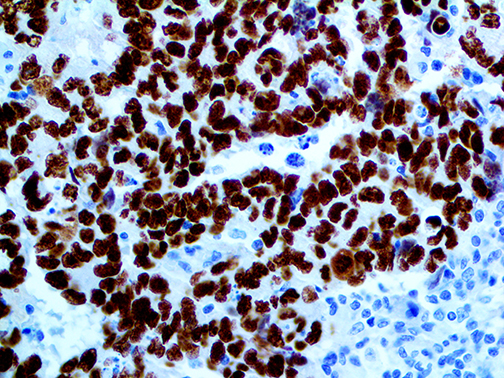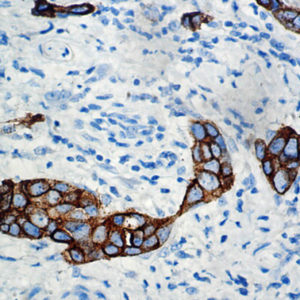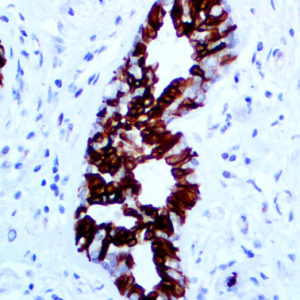
IHC of SALL4 on an FFPE Testicular Cancer Metastasis to Liver Tissue
| Intended Use | For In Vitro Diagnostic Use | |||||||||||||||||||||||||||||||||||
| Summary and Explanation | Sal-like protein 4 (SALL4) is a transcription factor encoded by a member of the Spalt-like (SALL) gene family, SALL4. There are four human SALL proteins (SALL1, 2, 3, and 4) with structural homology and playing diverse roles in embryonic development, kidney function, and cancer. SALL4 expression is low to undetectable in most adult tissues with the exception of germ cells and human blood progenitor cells. In normal testicular tissue, positive, weak SALL4 staining is observed in spermatogonia. In addition, a few (<5%) primary spermatocytes show dot-like weak SALL4 staining. Secondary spermatocytes, spermatids, spermatozoa, and Sertoli cells are negative for anti-SALL4. Leydig cells, rete testis, epididymis, spermatic cord fibroblasts, blood vessels, and hematopoietic cells are negative for SALL4. SALL4 is reactivated and misregulated in various cancer, such as acute myeloid leukemia (AML), B-cell acute lymphocytic leukemia (B-ALL), germ cell tumors, gastric cancer, breast cancer, hepatocellular carcinoma (HCC), lung cancer, and glioma. In many of these cancers, SALL4 expression has been compared in tumor cells to the normal tissue counterpart, e.g. it is expressed in nearly half of primary human endometrial cancer samples, but not in normal or hyperplastic endometrial tissue samples. Often, SALL4 expression is correlated with worse survival and poor prognosis such as in HCC, or with metastasis such as in endometrial cancer, colorectal carcinoma, and esophageal squamous cell carcinoma. It is unclear how SALL4 expression is deregulated in malignant cells, but DNA hypomethylation in its intron 1 region has been observed in B-ALL. In solid tumors such as germ cell tumors, SALL4 protein expression has become a standard diagnostic biomarker. SALL4 demonstrates 100% sensitivity and stains more than 90% tumor cells in all intratubular germ cell neoplasia, seminomas, dysgerminomas, embryonal carcinomas, and yolk sac tumor (YST) (both pediatric and postpubertal). SALL4 is also positive in most cases of teratoma and the mononucleated trophoblastic cells in choriocarcinomas. Most non-testicular tumors from various organs and sites are negative for SALL4, though an occasional carcinoma or sarcoma may show weak SALL4 staining in less than 25% of tumor cells. | |||||||||||||||||||||||||||||||||||
| Antibody Type | Mouse Monoclonal | Clone | 6E3 | |||||||||||||||||||||||||||||||||
| Isotype | IgG1/K | Reactivity | Paraffin, Frozen | |||||||||||||||||||||||||||||||||
| Localization | Nuclear | Control | Testis, Seminoma, Yolk Sac Tumor | |||||||||||||||||||||||||||||||||
| Presentation | Sall4 is a rabbit monoclonal antibody derived from cell culture supernatant that is concentrated, dialyzed, filter sterilized and diluted in buffer pH 7.5, containing BSA and sodium azide as a preservative. | |||||||||||||||||||||||||||||||||||
| Availability |
| |||||||||||||||||||||||||||||||||||
| Note: For concentrated antibodies, please centrifuge prior to use to ensure recovery of all product. | ||||||||||||||||||||||||||||||||||||



